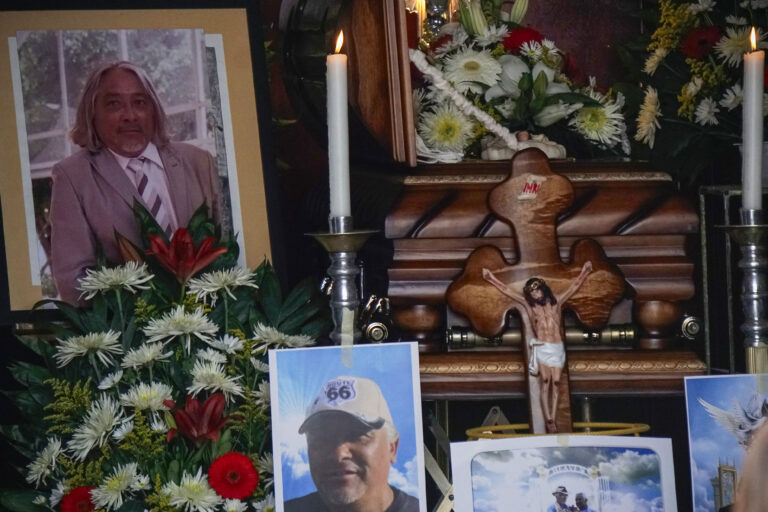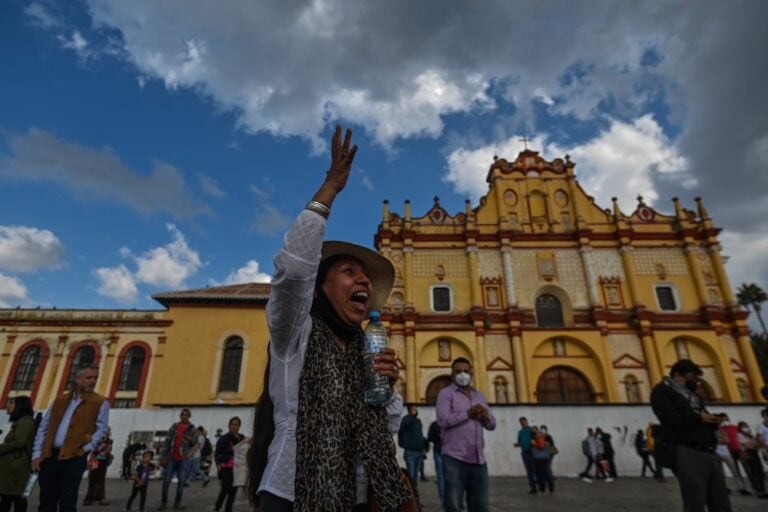"The majority of Mexican journalists have become war correspondents in their own country ever since President Felipe Calderón launched his war against drug trafficking and the battles spilled out into the streets," says Turati.
(IPI/IFEX) – The following is an article by Marcela Turati who works for the magazine Proceso covering the social effects of violence related to drug trafficking in Mexico:
MEXICO CITY, April 30, 2012 – “My city finds itself in a state of panic. There is shooting everywhere. People see bodies in the streets. A curfew has been self-imposed. The drug traffickers have silenced our newspaper. We cannot publish anything because they threaten us: they have killed and kidnapped our colleagues. People are afraid and frustrated, understandably wanting their newspaper to tell them what is happening, but unfortunately we cannot…”
“The paper for which I work was attacked. Many have resigned. The owner of the paper doesn’t want to help us. The journalists who have been attacked need psychological care…”
“Two colleagues and I were kidnapped after we reported that inmates were leaving the prison at night. Our captors hit us in the head, legs, and knees so that we couldn’t escape. They subjected us to psychological torture and afterwards they freed us. I decided to flee with my family to seek refuge in this country. We left everything, arriving with practically nothing, no clothes, no food. The situation here is very difficult…”
Over the past six years, we journalists have become familiar with such testimonies. Reaching journalist networks and press freedom organisations, they function as SOS signals sent out by colleagues on the frontlines. It sounds exaggerated – but it isn’t. The majority of Mexican journalists have become war correspondents in their own country ever since President Felipe Calderón launched his war against drug trafficking and the battles spilled out into the streets.
Just as the violence surprised all Mexicans, we journalists were also caught unprepared. The emergency required us to improvise coverage in a better way than we were able to. From the “executometer” – as we coldly term the daily death count – we move to the horrific tales of massacres, the testimonies of an ever-greater number of victims, the coverage of the rotten justice system and more, until we are no longer able to classify what we do because it goes beyond the limits of horror and absurdity.
As the violence has grown, so have the “zones of silence”. Due to threats, assassinations, and attacks, entire regions of the country – some of which resisted heroicising the dictators of organised crime – were left without information. At times, citizens felt obliged to turn themselves into reporters, taking to social networks to tell the stories traditional media outlets no longer can.
A generalised symptom of the profession is fear – and with good reason.
According to ARTICLE 19, 66 journalists have been murdered in Mexico since the year 2000: 13 have disappeared, and 33 media outlets have been the targets of explosions and armed attacks. The majority of news organisations have left threatened reporters to their own luck – and forgotten those who have been kidnapped or killed. The government’s message is one of impunity, which fuels the repetition of these tragedies. And expands the silence. No statistic can reflect the horror, the feelings of censured or threatened journalists, who have lived with nightmares, who have their last will ready, or who have already been displaced from this earth.
In spite of the fear, in spite of the general indifference of media owners and the acquiescence of the public, we Mexican reporters have not remained immobile. In many places, we have begun to organise ourselves, to learn from our own stories what isn’t taught in universities and what we didn’t learn on the job. The challenge is enormous: devising security measures for entering and leaving risk zones, learning how to take care of one’s psyche, drawing up new rules for interviewing victims so as not to turn them into victims again, learning methods of encrypting information and the use of secure technology.
We also know that we need to work as a team, in networks, if we want to avoid more journalists being silenced.
Thus far, the cases in which these organisational measures have achieved success are few but encouraging. In Morelos, for example, a group of political reporters have organised themselves in order to watch out for one another, visit crime scenes together, and offer assurance that no one would lose his or her life by being left behind. Or in Coahuila, the editing departments of several papers established rules for painstakingly checking every piece of information so as not to put the team at risk on account of a poor headline or incorrect fact.
Or a newspaper in Sinaloa, where journalists who have been threatened are sent to cover important national events to get them out of the state for a while until the situation has cooled down and they can return with their heads held high and a full-page cover story. Or a network of interstate editors who remember to publish the same article at the same time to provide cover for the media outlet threatened for writing about that same information.
There have also emerged networks of journalists who were previously competitors but given the nature of the emergency have tried to work together and teach one another how to take care of themselves.
Of such magnitude has been the change in our profession over the last six years, the six years in which we became correspondents in our national war.
BACKGROUND:
Marcela Turati is a journalist for the magazine Proceso, where she has been covering the social effects of violence related to drug trafficking in Mexico, including the impact of drug trafficking in terms of human rights, victims, supervision of social programs and poverty. A co-founder of the journalists’ social network “Periodistas de a Pie”, she has advocated since 2006 to promote human rights in journalism, to train journalists and to establish networks among journalists. An award-winning reporter, she has cooperated with journals and magazines in Peru, Chile, Colombia, Argentina, Uruguay, Ecuador and the United States of America.
Turati will also be among the notable panelists at IPI’s upcoming World Congress in Trinidad and Tobago, where she will be on a press freedom panel entitled: “Mexico, Cuba, Venezuela: The Big Three and their Impact on Press Freedom in the Region”.


